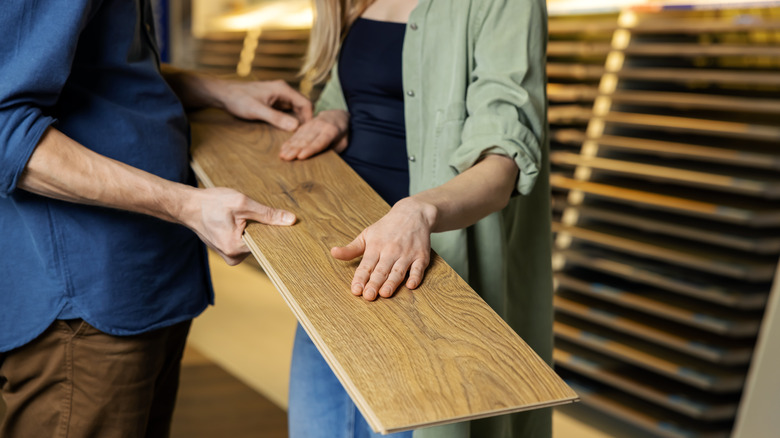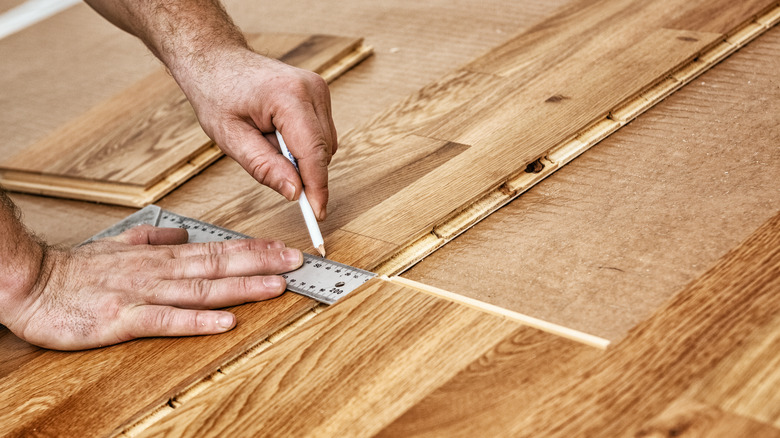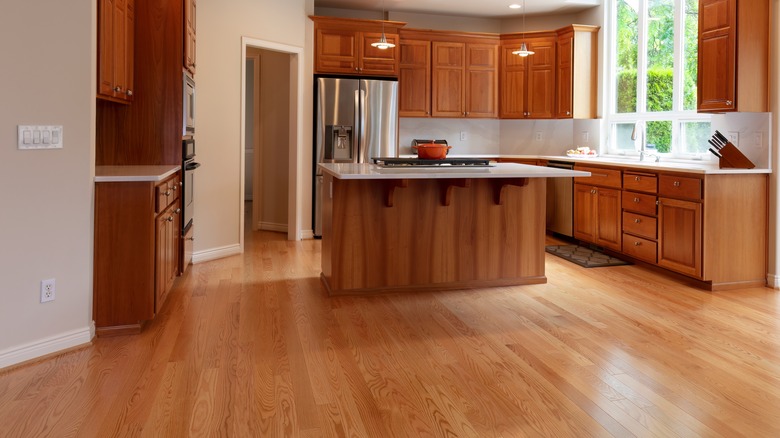Our Flooring Expert Says This Is The Best Material To Use To Get Hardwood Floors For Less
It's tempting to walk down the flooring aisle at a home improvement project and think about tearing up your old laminate floors or the carpet that never seems to get clean to put in new hardwood floors. Hardwood is a traditional, classic option for many homes, and today, there are numerous types of products on the market. The fact is hardwood floors will always be the right choice for many homes. Some seem super simple to install and long-lasting, but they can be expensive. So, which material really is the best alternative to use in your home when you're on a budget? You don't have to sacrifice quality for budget.
In an exclusive interview with House Digest, Brett Miller, Vice President of Technical Education & Certification at the National Wood Flooring Association, reveals the most cost-effective option, stating, "Generally speaking, engineered wood flooring can cost slightly less than solid wood flooring." However, he also warns that not all products are the same. "It's important to note that when we say 'engineered wood flooring,' we are talking about a floor that is made of real wood and not flooring that is made out of vinyl or plastic."
As you compare products, look closely at them. Miller states, "The top layer of engineered wood flooring is made of high-quality wood and the core material may be of the same species, a different species, or a composite material. That can mean the difference in price between engineered and solid wood floors."
Is engineered wood flooring really worth the savings?
If you're going to invest in wood floors, you probably expect them to last for years. An inferior product that's not built to stand up to the traffic in your home really doesn't save money. In an exclusive interview, Brett Miller shared the truth about the quality of these products. "Whether wood floors are solid or engineered, the price point really depends on several factors, including species, the cut of the wood, the thickness of the wear layer, and the width of the board. "
He also notes that trends matter not just for making your home look fabulous but because they also impact cost. "Choosing a species that is in high demand may cost more. While it may have less character, a plainsawn cut may cost less than a quartersawn angle cut." The next factor to consider in products is the uppermost layer. Miller reveals, "The thicker, sandable wear layers on many engineered wood floors will typically cost more than wood floors with thinner wear layers that are not sandable."If you want to be able to sand and refinish hardwood floors, then you'll need that thicker layer. "Wide planks of five to seven inches or greater are on trend right now, but the cost can increase with the width of a plank, and a more standard 2¼ inch plank could cost less," he also notes. Finding a balance between trend, aesthetics, and price takes careful consideration.
What are the pros and cons you really should consider
There's more to consider before buying hardwoods, explains Brett Miller in an exclusive interview with House Digest. Weigh both the pros and cons before choosing. "Engineered and solid wood floors both are very durable. In fact, if maintained properly, real wood floors can last for centuries." Also, consider where you're placing it. "Engineered wood flooring is ideal for basements, while solid and engineered may be installed in any room that is on or above ground in a house." Additionally, think about the long-term. What happens if you decide to paint and your darkwood floors no longer match? Miller reveals, "Solid wood floors and higher-priced engineered wood floors can be sanded and refinished numerous times during their service lives and can even be stained to give them a completely new look without having to replace the flooring."
What's the bottom line then? Another factor to think about when choosing flooring is the value of higher-quality flooring. Miller notes, "Going with real wood floors truly is an investment in your home. Real estate agents indicate that identical homes with wood floors can sell for up to 10 percent more than homes without wood floors." If you're planning to move in the future, note this: "We've also found that two-thirds of homeowners say they would choose wood floors for their dream home. Whether you choose solid or engineered flooring, the long-term value and return on investment of real wood is second to none."


